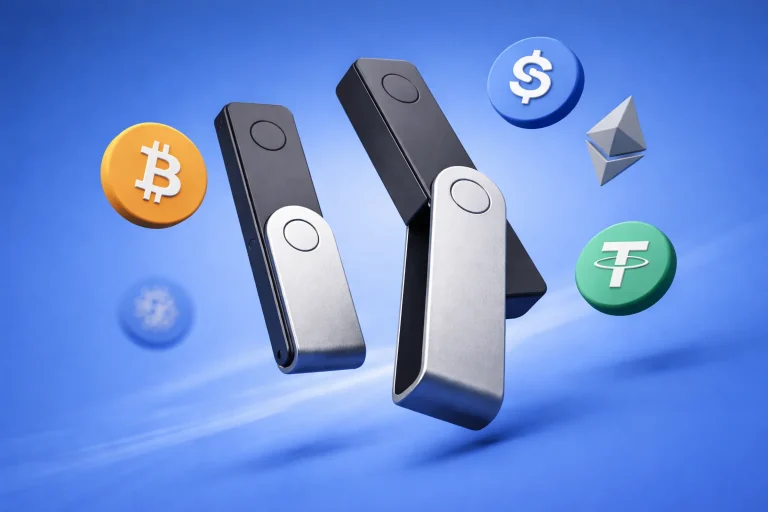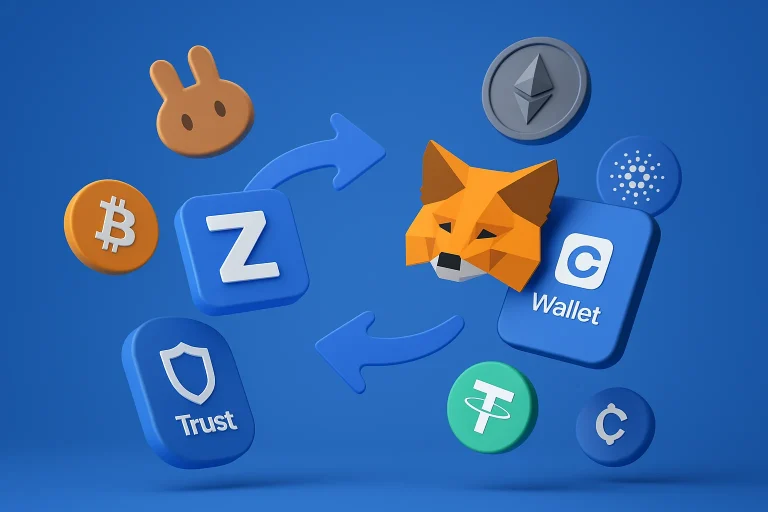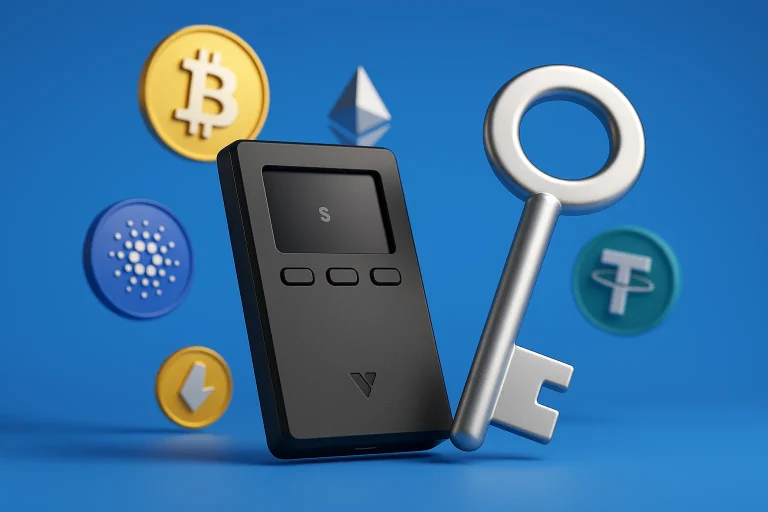Finding the best perpetual DEX is challenging in a saturated market. Many platforms lack daily trading volume, suffer from poor execution, or expose traders to unpredictable price impact and unreliable perpetual prices.
In a high-speed, decentralized finance environment, choosing the wrong DEX can lead to slippage, liquidations, and missed opportunities. Some lack proper incentives to reward traders, while others have poorly designed governance token models or fail to attract sufficient liquidity.
We’ve researched and identified the top 5 perpetual DEXs. These platforms offer the best combination of liquidity, efficient leveraged trading, security, stable asset prices, and proven on-chain infrastructure. This list delivers clarity if you want serious performance in perpetual trading.
Since perpetual DEXs operate without intermediaries, you’ll need a secure non-custodial wallet to trade safely. We’ve reviewed the best decentralized crypto wallets that offer full user control and seamless DeFi compatibility.
Table of contents
Quick Summary: 5 Best Perpetual DEXs | |
|---|---|
| Hyperliquid | Best for: Seamless Onboarding & High-Speed Trading Leverage: Up to 40x Assets: 100+ crypto perpetual pairs Fees: 0.02% maker / 0.05% taker Daily Trading Volume: ~$10B UX: Ultra-fast execution, non-custodial, no gas fees |
| AvantisFi | Best for: DeFi-Native Perpetuals & Real-World Assets Leverage: Up to 50x leverage on cryptocurrencies, and 100x on forex and commodities Assets: 100+ crypto, forex, RWAs, volatility indices Fees: 0.01% maker / 0.05% taker Daily Trading Volume: ~$195M UX: Composable with Ethereum/Arbitrum, modular vaults, advanced UI |
| dYdX v4 | Best for: Decentralized Liquidity Depth & Trading Volume Leverage: Up to 25x Assets: 50+ major crypto perpetuals Fees: 0.02–0.05% taker / up to -0.015% maker rebates Daily Trading Volume: ~$215M+ UX: High liquidity, Cosmos-based, requires Keplr or compatible wallets |
| Drift Protocol v2 | Best for: Dynamic Liquidity & Advanced On-Chain Trading Leverage: Up to 101x (perps), 5x (spot & swaps) Assets: 30+ crypto perpetual contracts Fees: 0% maker / 0.01%–0.04% taker Daily Trading Volume: ~$424M UX: Built on Solana, Just-in-Time liquidity, fast & efficient interface |
| Aster | Best for: Modular Risk Engine & Capital Efficiency Leverage: Up to 50x Assets: Crypto, forex, synthetic volatility products Fees: 0.015% maker / 0.05% taker UX: Custom appchain logic, flexible collateral, geared for advanced users |
Also, be sure to check-out our Best Decentralized Exchanges guide.
1. Hyperliquid – Best for Seamless Onboarding and High-Speed Trading
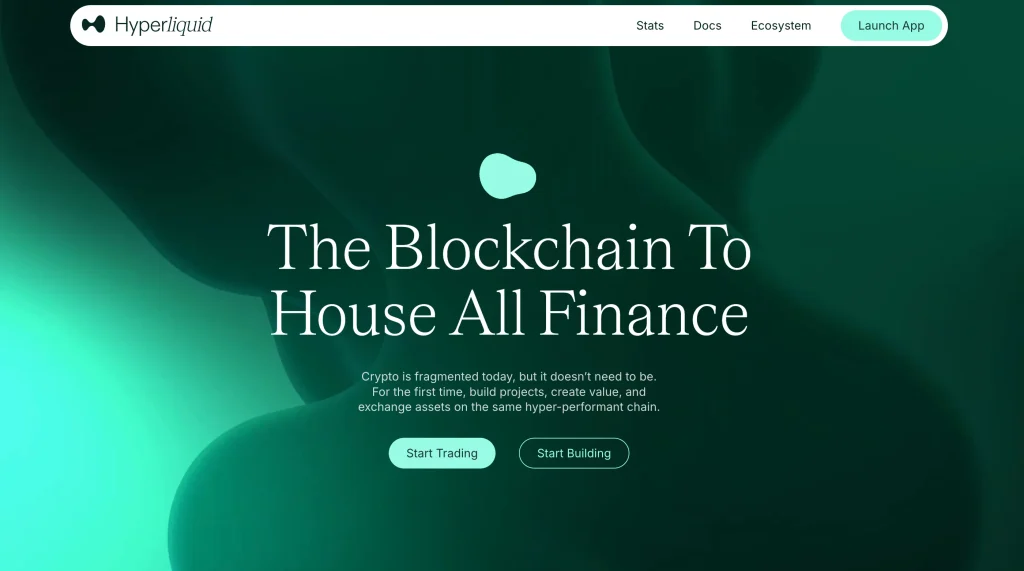
Hyperliquid is a fully on-chain perpetual DEX launched in late 2022 by a pseudonymous team of developers operating under the name “Hyperliquid Labs.”
It is not deployed on Ethereum or any existing layer 2. Instead, it runs on its own purpose-built L1 chain designed for high throughput and ultra-low latency. This unique approach allows Hyperliquid to offer a trading experience close to centralized exchanges while remaining decentralized.
Security is a core focus. The protocol has undergone third-party audits (by Zellic) and uses ZK-proofs for data availability and verification. Hyperliquid custody is non-custodial by design, meaning users retain full control of funds via their wallets.
There are no gas fees for trading on the Hyperliquid chain, and trading fees are fixed at 0.02% for makers and 0.05% for takers.
On Reddit, Hyperliquid receives praise for its smooth UI, low fees, and responsiveness. Users consistently highlight how orders execute quickly without slippage in most cases. However, some criticism exists around the opacity of the founding team and occasional UI glitches when new features are rolled out. Additionally, some traders express concern about the relatively small insurance fund compared to larger platforms.
Main Key Features of Hyperliquid | |
|---|---|
| Order Book Type | Fully on-chain order book and matching engine; |
| Base Infrastructure | Runs on a custom-built L1 optimized for speed and scalability; |
| Security Mechanism | ZK-proof enabled state verification; |
| Supported Markets | Supports perpetual contracts for 100+ assets; |
| Incentive Model | Native points and incentive systems for active traders; |
| Margin Options | Cross-margin and isolated margin support; |
| Trading Fees | No gas fees on trades. |
2. AvantisFi – Best for Innovative DeFi-Native Perpetuals
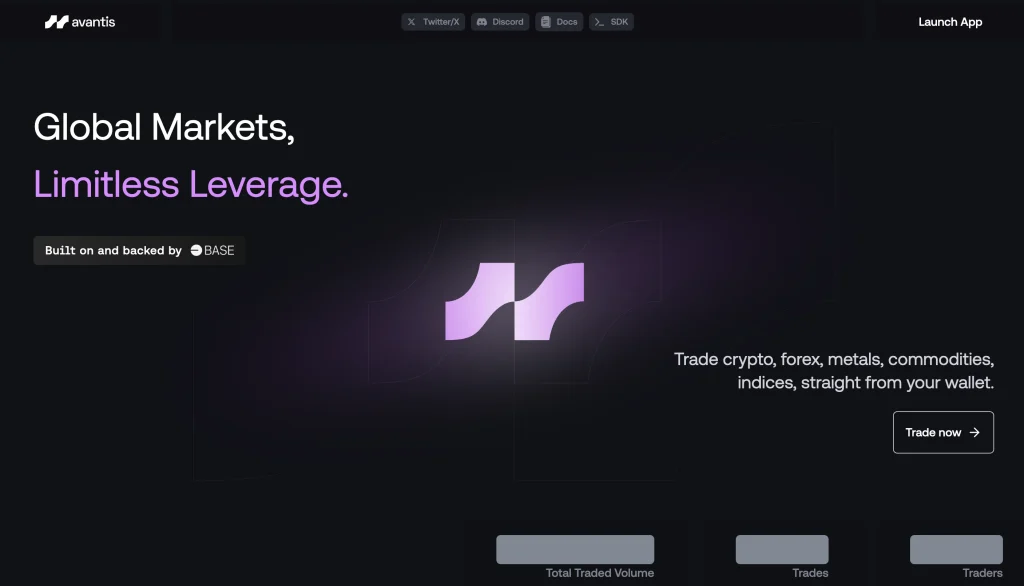
AvantisFi is a decentralized perpetual trading protocol launched in 2023. It is built on Ethereum and Arbitrum and offers DeFi-native traders exposure to a wide range of synthetic and real-world asset perpetuals. A transparent founding team leads the project with backgrounds in quant trading and smart contract development, and it has gained rapid traction for its unique features, such as on-chain risk management and tokenized vaults.
AvantisFi prioritizes modular security. It has been audited by firms such as Zokyo and Zellic and uses battle-tested, innovative contract frameworks. The protocol includes real-time risk monitoring and isolated vaults that limit systemic risk in the event of market failure. Users interact with the protocol through non-custodial wallets and retain full control of assets.
Trading fees are competitive: 0.01% maker and 0.05% taker fees, with no gas fees on Arbitrum and optional rebate incentives based on trading volume.
Reddit users commend the platform for its transparency, real-world asset support, and well-designed UI. However, some criticisms point to relatively lower liquidity during off-peak hours and occasional oracle latency on newer assets.
Main Key Features of AvantisFi | |
|---|---|
| Deployment Networks | Deployed on Ethereum and Arbitrum, ensuring high composability; |
| Market Coverage | Supports perpetual contracts on crypto, forex, commodities, and real-world assets; |
| Leverage Options | Up to 50x leverage on cryptocurrencies, and 100x on forex and commodities; |
| Liquidity Provision | Smart vaults for passive LPs with customizable risk exposure; |
| Supported Assets & Deposits | Supports USDC, ETH, and ARB deposits from wallets or bridges; |
| Reward Mechanism | Native staking and points system for community rewards; |
| Security Audits | Audited by Quantstamp and Nethermind; |
| Oracle System | Oracle aggregation from Chainlink and RedStone for real-time pricing. |
3. dYdX (v4) – Best for Decentralized Liquidity Depth and Trading Volume
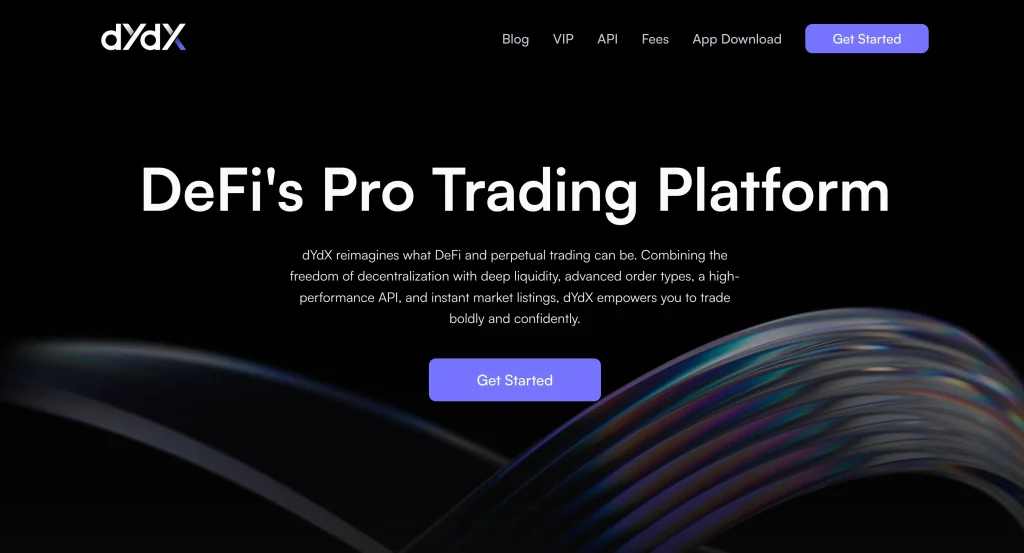
dYdX v4 is the fully decentralized iteration of the dYdX protocol, launched in late 2023. It marks the protocol’s full migration from Ethereum Layer 2 (StarkEx) to its own custom-built Layer 1 blockchain based on the Cosmos SDK and CometBFT consensus. This version completely decentralizes the order book, matching engine, and governance, with validators and stakers securing the network.
Founded by Antonio Juliano and initially incubated by Paradigm, dYdX has established itself as one of the most liquid perpetual DEXs in the world. With v4, the protocol removed all centralized dependencies, including off-chain order books. It has been audited by multiple firms, including Informal Systems and Certora, and continues to receive third-party formal verification on its smart contracts and core blockchain modules.
Fees are tiered based on 30-day volume, with taker fees ranging from 0.05% to 0.02% and maker rebates up to -0.015%. There are no gas fees for trading, as transactions on the dYdX Chain are subsidized by the protocol’s treasury.
Reddit traders view dYdX v4 as one of the most reliable platforms for high-volume trading, praising its liquidity, depth, and performance. Criticisms include the complexity of the Cosmos wallet onboarding and limited cross-chain asset access.
Main Key Features of dYdX (v4) | |
|---|---|
| Blockchain Infrastructure | Runs on a sovereign Layer 1 chain built using Cosmos SDK; |
| Order Book Type | Fully decentralized order book and matching engine; |
| Market Coverage | Supports perpetuals for 50+ major crypto pairs; |
| Leverage Options | Offers up to 25x leverage on most listed assets; |
| Collateral Support | Accepts USDC as the native collateral (IBC-based bridging supported); |
| Governance Model | Protocol governance through DYDX token staking and voting; |
| Validator Network | Open validator set with staking rewards and slashing; |
| Security Measures | Audited by multiple security firms with real-time monitoring integrations. |
4. Drift Protocol v2 – Best for Dynamic Liquidity and Advanced On-Chain Trading
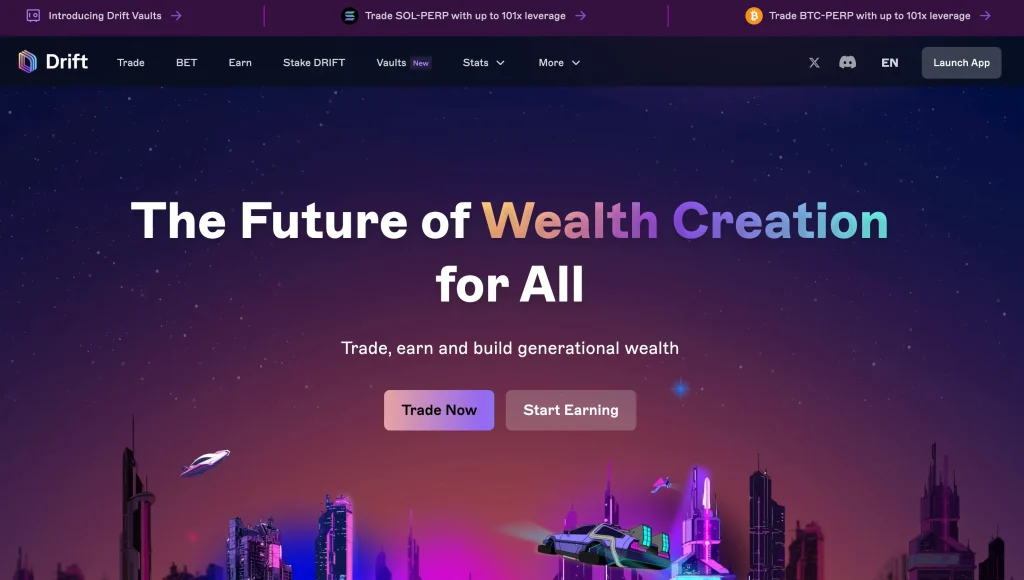
Drift Protocol v2 is a Solana-based decentralized perpetual exchange (perp DEX) that launched its upgraded version in late 2023. Designed to rival centralized exchanges in execution speed and efficiency, it blends automated market makers with an on-chain order book using a unique “Just-in-Time” liquidity mechanism. This system allows liquidity providers to supply deep liquidity dynamically when a trade occurs, minimizing slippage and improving capital efficiency.
Security is handled through battle-tested smart contracts, frequent audits (including by Trail of Bits), and Solana’s low-latency infrastructure. Drift is entirely self-custodial, requiring no identity verification or intermediaries.
Users benefit from low fees, with maker fees at 0% and taker fees ranging from 0.01% to 0.04%, depending on volume and fee tiers.
Reddit discussions strongly support Drift’s innovation in liquidity design and user experience. Many active traders praise the fast execution and composability with the broader Solana DeFi ecosystem. Some concerns exist around liquidation risks due to high leverage and sudden price volatility on lower-liquidity pairs, especially during Solana network congestion. However, its integration of real-time price feeds, cross margin, and advanced risk controls has been a strong counterbalance.
Main Key Features of Drift Protocol v2 | |
|---|---|
| Blockchain Infrastructure | Built on Solana, offering near-instantaneous execution; |
| Liquidity Model | Hybrid order book + virtual AMM model with “Just-in-Time” liquidity; |
| Leverage Options | Offers up to 101x leverage on supported perpetual futures contracts; |
| Market Coverage | Supports perpetual contracts for 30+ crypto assets; |
| Collateral Support | Accepts USDC and SOL for collateral and deposits; |
| Margin Options | Supports cross margin and isolated margin; |
| Security Measures | Audited smart contracts with integrated real-time price feeds; |
| Trading Fees | No gas fees on Solana transactions; |
| Staking & Governance | Offers staking rewards through DRIFT governance. |
5. Aster – Best for Modular Risk Engine and Capital Efficiency
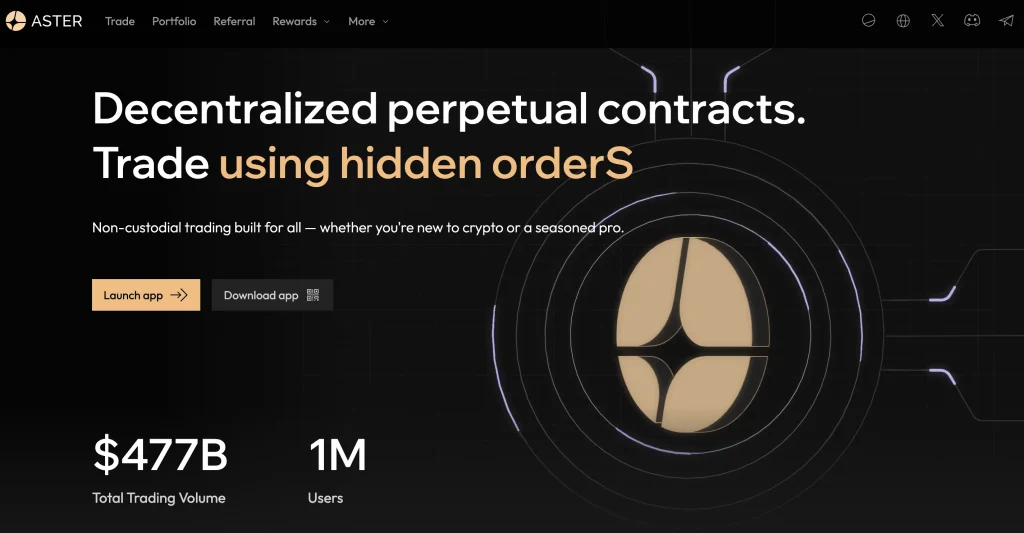
Aster is a cutting-edge entry among decentralized perpetual exchanges. It was launched in early 2024 and operates on a modular appchain framework optimized for perpetual futures.
Built using the Celestia DA layer and leveraging custom execution environments, Aster targets serious traders and protocols needing programmable risk management, composable smart contracts, and flexible collateral options.
Security is architected from the ground up, with each market deployed as its isolated contract module, minimizing cross-market liquidation risks and protocol contagion. The non-custodial platform uses ZK-verified price feeds and bonded Oracle relayers to prevent Oracle manipulation. Salus Security and Zellic conducted code audits before launch, and bug bounties continue attracting white-hat participation.
Aster supports perpetual trading across synthetic crypto, forex, and volatility index assets, with up to 50x leverage and fully modular funding rates per market. The trading fees are highly competitive, at 0.015% maker and 0.05% taker, and gas fees are negligible due to efficient rollup settlement.
Reddit sentiment is cautiously optimistic: advanced users appreciate Aster’s risk primitives and flexibility, while some criticize its niche UX and limited onboarding resources for non-technical users.
Main Key Features of Aster | |
|---|---|
| Infrastructure Stack | Modular appchain built with Celestia + Cosmos SDK; |
| Smart Contract Support | Custom market deployments using programmable smart contracts; |
| Market Coverage | Supports perpetual contracts for crypto, forex, and synthetic indices; |
| Leverage Options | Up to 50x leverage with adaptive funding rates; |
| Collateral Support | Accepts collateral in USDC, USDT, ETH, and protocol-native AST token; |
| Trading Features | Supports limit orders, cross margin, and sub-account trading; |
| Risk Management | Isolated markets reduce liquidation risks and increase capital efficiency; |
| Security Measures | Audited by Spearbit and Zellic with continuous monitoring; |
| Fee Structure | Near-zero gas fees with rollup settlement. |
Methodology: How We Selected the Best Perpetual DEXs
To create this list of the 5 best perpetual DEXs, we conducted an in-depth evaluation of over 30 platforms across key technical and trading dimensions. Our approach focused on measurable performance, user experience, and system design.
Key criteria included:
- Liquidity and Market Depth – We analyzed each platform’s open interest, historical daily trading volume, and whether they offered unmatched liquidity without causing wider spreads or higher slippage.
- Leverage Options and Trading Tools – We prioritized DEXs that support up to 50x leverage, with built-in advanced order types, margin systems, and virtual AMMs that enhance capital efficiency.
- Fees and Cost Efficiency – We compared platforms based on trading fees, gas fees, and hidden costs that impact real trader P&L. We also considered incentives that reward traders fairly.
- Security and Infrastructure – Only protocols with audited smart contracts, proven uptime, and risk management systems were included. Preference was given to modular or appchain designs that reduce the reliance on single points of failure.
- User Accessibility and Wallet Support – Ease of use was rated based on onboarding flow, UI clarity, and support for wallets like Coinbase Wallet, Keplr, or MetaMask.
By combining technical metrics with user sentiment and audit credibility, this methodology ensures each DEX on this list meets the needs of modern perpetual trading at scale.
FAQ
What is a Perpetual DEX?
A perpetual DEX (decentralized exchange) is a non-custodial trading platform that allows users to trade perpetual futures contracts without intermediaries. These decentralized exchanges offer 24/7 markets for crypto and synthetic assets, mimicking traditional futures without expiration.
How Does a Perpetual DEX Work?
Perpetual DEXs use smart contracts and price feeds to enable trading of perpetuals. Traders can open long or short positions with leverage, settle directly on-chain, and interact with automated market makers or order books for pricing and liquidity.
How Do Perpetual DEXs Differ From Traditional DEXs?
Traditional DEXs enable spot trading where assets are exchanged directly, while perpetual DEXs allow trading of perpetual futures contracts, which are synthetic positions with no expiry. They support leverage, funding rates, and long or short positions, focusing on derivatives rather than asset swaps.
Why Are Perpetual DEXs Popular Among Leverage Traders?
Perpetual DEXs enable leveraged trading with real-time exposure to asset prices without holding the underlying asset. Platforms with high open interest and deep books offer unmatched liquidity, allowing large positions with minimal slippage even in volatile markets.
Do Decentralized Perpetual Exchanges Require Identity Verification (KYC)?
No, most decentralized perpetual exchanges do not require identity verification. Users can trade using self-custodial wallets without KYC restrictions, maintaining full control over their funds and privacy.
What are the Advantages Of Perpetual DEXs Over Centralized Exchanges?
Perp DEXs offer self-custody, no KYC, transparent smart contracts, and permissionless access. They reduce risks like fund seizure or fraud and eliminate reliance on centralised exchanges for execution or custody.
How To Perform Leverage Trading On DEXs?
To start leveraging trading, connect a Web3 wallet, deposit collateral (e.g., USDC), select the leverage level (e.g., 5x–50x), and execute perpetual contracts. DEXs handle liquidation risks automatically via smart contracts.
How to Choose a Reliable DEX?
Look for platforms with strong security audits, deep liquidity, low fees, transparent teams or governance, and robust funding rate mechanisms. Evaluate support for cross-margin, limit orders, and consistent uptime.
Final Thoughts
Now you should see the best perpetual DEXs to explore, as these platforms were selected based on real performance metrics: liquidity, fees, leverage, and the ability to respond to market volatility with speed and efficiency.
Whether you’re focused on low-cost execution, capital-efficient design, or earning protocol-native yield, each DEX listed offers a strong value proposition.
But remember: in decentralised finance, you don’t rely on intermediaries; you’re in control. That means you own both the opportunity and the risk.
Also, this content is not financial advice. Perpetual trading involves high risk, especially with leveraged positions. Always do your research, manage your risk, and never trade more than you can afford to lose.


